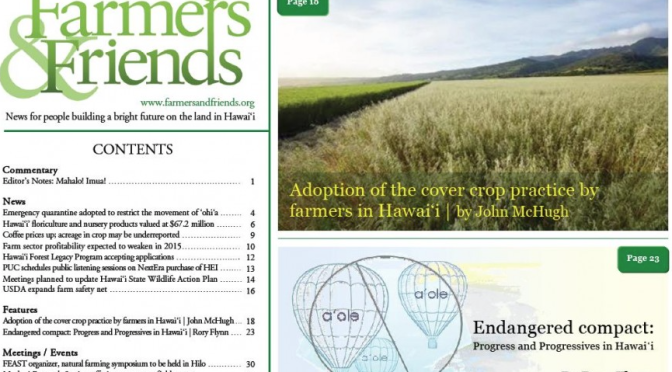I look back at the amazing flumes and the ditches that the sugar plantations built, and I wonder if those could even get built nowadays. We’d have a really hard time. I don’t know if we could.
Today we spend our time more time thinking of the reasons we can’t do projects like that than than actually doing them. It’s not the education of our people, it’s our attitudes. Too much “no can,” or excuses. Too much talking and not enough doing. We’ve become risk averse.
Rory Flynn wrote an editorial at Farmers & Friends called Progress and Progressives in Hawai‘i that’s a great read. It talks about how we are no longer innovative and excited about progress and big transformational change in our society.
He quotes Peter Thiel, a hedge fund manager and the co-founder of PayPal: “We wanted flying cars; we got 140 characters (Twitter).”
And he discusses our situation here in Hawai‘i:
We have niche opportunities to excel despite our far-flung geography and high cost of living. International collaboration in astronomy is one. Seed crop R&D is another. Renewable energy is one more giant niche opportunity – solar, wind, geothermal and ocean thermal conversion.
So what are we doing? We have declared war on two of the most promising sectors of our economy, the Thirty Meter Telescope and seed companies. What good does this do us? Well, it allows us to flex the emotion-laden muscles of sovereignty and aloha ‘aina. Meanwhile, our best educated youth depart for jobs on the U.S. mainland. And, in August, onlinedegrees.com declared Hawai‘i the worst state in the nation for graduates to move into post-college careers due to “relatively low employment opportunities” and the nation’s “most expensive housing market.”
Not so long ago, progressives in Hawai‘i believed in progress. They thought that innovation boosted the human prospect. Call it the “Burns Years,” post-statehood. There was a lively sense that Hawai‘i’s people could accomplish great things as they shed the plantation era yoke of “subtle inferiority.” As equality took root, an easygoing collaborative style blossomed. It tasked the Democratic Party to develop a new, diversified economy. It gave us raucous entertainments at Territorial Tavern, spirited conversations at Columbia Inn and policy wonk breakfasts at Washington Place. People might disagree – and often did – but it was understood that bad blood was bad manners. People knew when to say, “Eh, no act, brah.”
There’s a lot more – see what Boeing and Germany have to do with it, too.
The take away is that it’s really about trust, community, honor, all of us and not a few of us, and not, no can. CAN!

